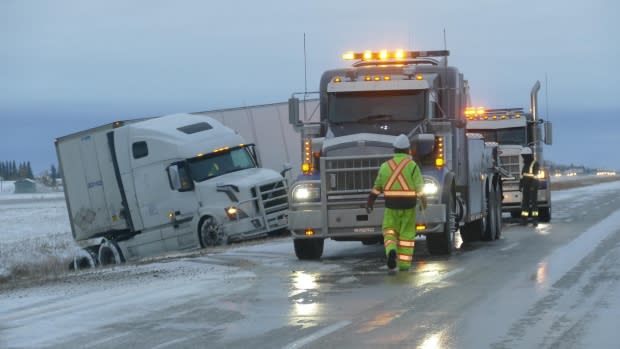Humboldt Broncos crash spurred national changes to semi truck rules, says Sask. Minister
The Humboldt Broncos tragedy helped Canadian politicians see the need for better semi truck driving rules, says Saskatchewan Highways Minister Lori Carr.
Carr co-chaired a meeting on Monday in Montreal where provincial, territorial and federal transportation ministers ministers agreed to make training mandatory for all Canadian semi drivers next year.
Carr says everyone is hopeful this will make the roads safer and that some positive change can come from the Broncos' crash back in April. She admitted it's a change that likely should have been made long ago.
"All of these vehicles drive coast-to-coast-to-coast and it shouldn't matter which province you're in, you should have the peace of mind that all of the drivers are trained consistently and safely," Carr said.

Sask farm exemption under review: Minister
Saskatchewan had already decided to make training mandatory beginning this spring. Farmers will likely be exempt, although Carr says a committee is reviewing all of those rules.
Advocates are praising the decision to make training for semi drivers mandatory across Canada, but they say there's still more work to do.
"I'm just very grateful the ministries have all met and are moving forward and agree that it needs to be federally regulated. That's wonderful," said Pattie Fair, whose petition calling for national rules for semi drivers attracted more than 2,100 signatures over the past week.
Details of the new rules are unclear. It appears each province will still be responsible for semi driver training. It's also unclear, for example, whether exceptions such as for farmers in Saskatchewan will be allowed in each jurisdiction.
Fair, whose husband was killed in a 2017 crash with a semi, said mandatory training will make the roads safer. Trucking is the second most popular occupation in Canada, with an estimated 300,000 drivers on Canadian roads.

University of Manitoba professor Ahmed Shalaby called it "a very important step." He said the training needs to be evidence-based and data should be collected on which driving schools are producing the safest graduates. The United States is moving toward a rigorous national system of data collection, Shalaby noted.
"I'm very hopeful that will happen," Shalaby said.
Shalaby praised Fair and the families of the Humboldt Broncos victims for their courage and advocacy. He said their voices were a powerful force in making policy makers aware of the situation.
At the moment, only Ontario has mandatory training. Saskatchewan and Alberta are set to implement it in the spring.

